Germany Announces First Military Expansion Since Cold War Amid Cyber Threats, US Pressure

For the first time since the end of the Cold War, Germany will expand its military to respond to new threats in the cyber realm and growing involvement in operations overseas, the government announced Tuesday.
Germany will add 7,000 military and 4,400 civilian jobs over the next seven years in total. “Rarely has the German military faced higher demands than in the last few months,” said Defense Minister Ursula von der Leyen. “We need to get away from a shrinking trend and toward a level of breathing space when it comes to personnel.”
Von der Leyen said the decision to expand the military is part of a larger effort that will also involve military equipment purchases. The decision comes after major terrorist attacks hit Paris in January and November 2015 and Brussels in March 2016, leaving hundreds of people dead.
Germany's military expansion is expected to focus on cyber defense and naval capabilities as well as aerial surveillance, an unnamed official told Bloomberg. The personnel expansion is expected to cost $102 million in the first year. Overall military spending will increase from 34.3 billion euros ($39 billion) to 39.2 billion euros by 2020.
Germant’s military has shrunk significantly over the last 26 years. In 1990, at the moment of German reunification, there were 800,000 military and civilian personnel in the country’s armed forces (East and West Germany combined). The number has fallen to 185,000 troops and 56,000 civilians, Reuters reported.
More than 1 million refugees entered Germany last year, fleeing conflicts and repressive states including Syria, Iraq and Afghanistan. German officials said the military needs 14,300 additional troops to deal with missions including sea rescues of refugees. More than 1,300 refugees have died so far in 2016 while attempting dangerous sea crossings into Europe, the International Organization for Migration reported.
Other missions Germany will focus on include supporting U.S. airstrikes against the Islamic State group in Iraq and Syria and fighting militant groups in Mali.
During remarks in Germany at the end of April, U.S. President Barack Obama warned against European complacency on military spending and urged members of the NATO military and political alliance to meet defense spending contributions.
“Every NATO member should be contributing its full share – 2 percent of GDP – towards our common security, something that doesn’t always happen,” Obama said. “And I’ll be honest, sometimes Europe has been complacent about its own defense.”
Germany’s military budget was only slightly over 1 percent of its GDP in 2014, according to the World Bank.
“A quarter-century of a shrinking military is over. It is time for the German armed forces to grow,” Von der Leyen said Tuesday.
© Copyright IBTimes 2025. All rights reserved.






















